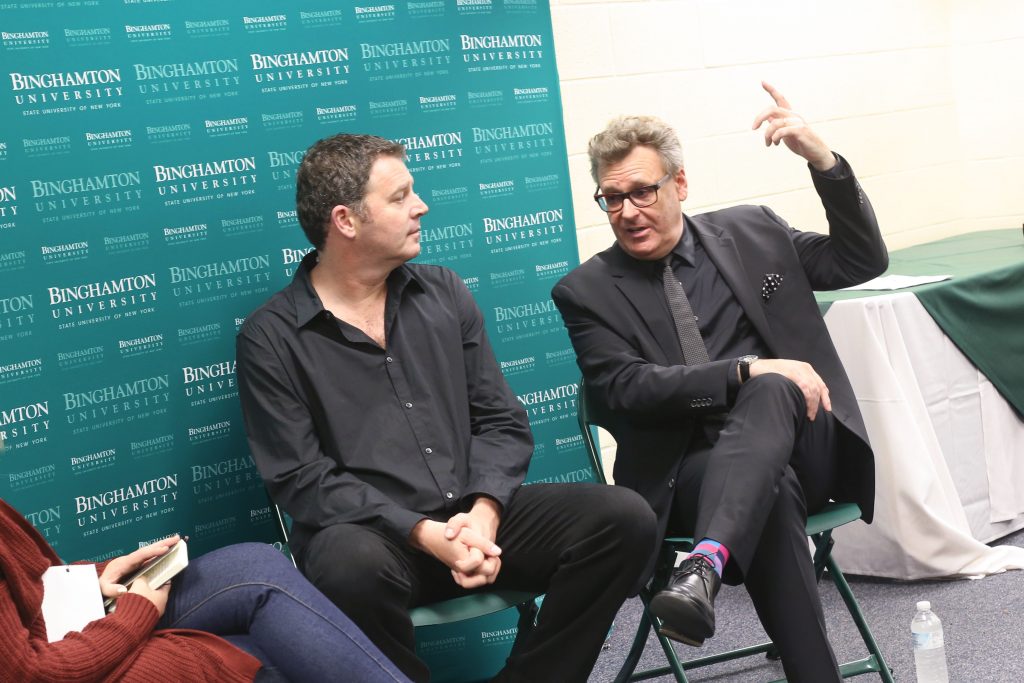
Interview has been edited for clarity and length.
Odeya Pinkus: How do you guys prepare for a college show like this one?
Brad Sherwood: Well, in a certain sense we prepare by just having done a bunch of shows over the years. But Greg and I haven’t really done that many two-person shows together.
Greg Proops: No, we decided tonight we might not have ever done a two-person show together.
BS: We’ve done shows for years, decades together in many incarnations, but never two so this is maybe our first one.
GP: So yeah, we were just excited to do that.
OP: So how do you guys find that you can still connect with the audience even when it’s that size — hundreds of people?
BS: Well, I think you always connect with the audience no matter how far in the back row, probably better than most types of performances. Aside from stand-up, the only other thing where you are sort of living and breathing together. You’re taking their suggestions and you’re bringing them up onstage. It’s probably the most interactive show that they’re gonna see.
You don’t get to go onstage and give suggestions for a song at a Broadway musical. You go, you watch the entire performance, it’s complete and it’s the same every night. We sort of go with the audience on a journey. I think that bonds you together with your audience in a way that no kind of other performance does. It’s way less adversarial than, like, a stand-up in a comedy club. Those people are drinking, they sit there, they kind of cross their arms and they’re like, “Okay funny boy, whatcha got?” It’s almost like they’re judging you, and you’ve got to force them to laugh. And here it’s like totally collaborative.
OP: So you guys are obviously veterans in the improv world. What was the first time that you guys performed improv where you were like, “Hey, this is something I want to do, this is something I can do?”
GP: I was a teenager, like you guys — I was 19. And there was an improv group in the cantina in my dormitory, and I went and saw them play, and I was like, “Oh, I can do that.” And so they did an audience spotlight where they brought someone out of the crowd. The next week I went and sat in the front row. They said, “Can we have a volunteer?” and I jumped on stage and I did an improv with them, and then the next day — this will give you an idea of how long ago it was — I was playing pinball in the student union and my buddy Reid came up and said, “Oh, you wanna be in the group?” and that’s how I leaned how to do it. I never went to The Groundlings or any of those schools, I learned from all of the other kids at San Francisco State.
BS: Actually, very similar, I was in college and saw a three-person group at like a — it was like a restaurant kind of thing, not a theatre or anything. And I was just blown away. I laughed, I thought it was amazing, I wanted to do that. And then I was in a comedy group, and then started taking improv, and got into a bunch of different groups when I moved to LA, and started doing shows.
GP: And that’s where we met — like 25,000 years ago at the uh, no Theatre/Theater the other one — was it Theatre/Theater?
BS: We probably met in ‘88, ‘89.
GP: What was that group, LNM Sports?
BS: Theatresports.
GP: Theatresports.
BS: LA Theatresports.
OP: Do you think you can improve at improv?
BS: Experimentally, you can get more confident, but it’s one of the only things people get good at that you don’t achieve greatness by repetition. If you’re shooting a basketball, you get good by the sense memory of doing it exactly the same way every time. In improv, you have to take that funny joke, throw it away and never do it again because you want to always make it fresh and different. And really on a certain level, improv is all about the creative way we deal with mistakes, because technically we don’t have anything planned.
So, everything that happens from this moment on, it is a mystery, so it’s treated like a mistake. Mistakes are just opportunities that you don’t know what’s gonna happen. A mistake is when something happens and you didn’t expect, but every moment in improv is happened and you didn’t expect [it].
OP: Improv is a beautiful metaphor for life. I firmly believe that.
GP: People who say they can’t improvise — it’s like, you’re improvising all the time.
BS: Every conversation you have, everything you do all day long, when you’re driving, you’re improvising.
OP: What do you guys miss most about the early days of “Whose Line is it Anyway?” and that big chunk of your career?
BS: Greg and I don’t do as many of the new ‘Whose Lines’ on CW as we used to do in the good old days, but it breathes life into all the other stuff that we do, all the live touring that we do, all the improv. He goes out with some of the guys, I go out with Colin [Mochrie] a lot, and his stand-up — part of the momentum that keeps people coming to see us is the fact that we’ve had like three generations of human beings watching this as kids.
GP: What I miss is not being told, “I was little when I started watching you.” Because now I always get that. Now I’m this old and people go, “I was so little when I started watching you.”
BS: “I’ve been watching you forever!”


